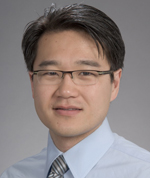February 2015

Peter Chen, MD
Early in his career at the University of Washington, Peter Chen, MD, approached William “Bill” Parks, PhD, who was then leading the Center for Lung Biology, with a new theory about the proteoglycan, syndecan-1, as it relates to the basic mechanisms of lung injury and repair.
“He had an idea of how syndecan-1 was directly facilitating epithelial repair,” Dr. Parks says. “I thought it was a great idea, and I said: ‘It’s yours: take this project and run with it.’”
Given his mentor’s advice and the necessary autonomy, Dr. Chen quickly established himself as an authority on the protein. Since then, he’s authored and co-authored several papers on the subject, including “The Transmembrane and Extracellular Domains of Syndecan-1 Have Distinct Functions in Regulating Lung Epithelial Migration and Adhesion,” published in 2012 in the Journal of Biological Chemistry. He’s also acting as principal investigator in two studies—“Syndecan-1 in Lung Repair” and “Syndecan-1 Regulation of Influenza Infection”—both funded by National Institutes of Health.
“Our overarching idea is that syndecan-1 is protective for the epithelium,” Dr. Chen says. “When it’s cleaved off of the cell surface such as during injury, that shedding event actually causes the lungs to become more susceptible to worsening injury. And that’s the framework of how we’re studying influenza-induced lung injury.”
These days, Dr. Chen is focusing just as diligently on the success of others. As director of the Division of Pulmonary and Critical Care Medicine at Cedars-Sinai Medical Center in Los Angeles, Dr. Chen leads a faculty of 16, including his old mentor, Dr. Parks, who is the scientific director of the Women’s Guild Lung Institute at Cedars-Sinai. Dr. Chen joined Cedars-Sinai in 2013, after being on faculty in the Division of Pulmonary and Critical Care Medicine at the University of Washington, where he completed his Pulmonary and Critical Care Fellowship in 2005.
“One of my first moves when I became chair of the Department of Medicine at Cedars-Sinai Medical Center was to try and recruit Peter from the University of Washington,” says Paul W. Noble, MD, the Vera and Paul Guerin Family Distinguished Chair in Pulmonary Medicine at Cedars-Sinai. “I had been following his work closely and thought he had outstanding leadership potential. He has done a spectacular job…Peter will be a leader in our field for years to come.”
Dr. Parks adds: “Peter is skilled in many ways. He’s an outstanding and creative scientist, but he has really been emerging as a great division leader. He has a strong sense of developing trainees and faculty, doing the right things to push them along and facilitate their advancement.”
Dr. Chen has been charged with making his division more academic. “Traditionally, the fellowship program at Cedars-Sinai was a very clinical program,” Dr. Chen says. “We are making it a more academic program and have created a dedicated research track in which we have current fellows as well as will continue to recruit prospective fellows into. The plan is to develop trainees into physician-scientists and lay out the steps to become the next Paul Noble.
“Funding is drying up, and many universities are having a tough time supporting the training of researchers. But here at Cedars-Sinai, there’s support from the leadership for these activities, and because of that fact, my job is a lot easier. That and surrounding myself with good people really has been the key to success.”
Dr. Chen earned his medical degree at Baylor College of Medicine in 1999 and completed his internal medicine residency at University of Texas Southwestern Medical Center in Dallas in 2002. After finishing his fellowship, he continued as a research fellow at the University of Washington before joined as faculty in 2007.
As chair of the ATS Members in Transition and Training Committee, of which he has been a member since 2008, early career professionals are Dr. Chen’s primary focus.
“The work we do in the committee is to try to elevate the status of the early career professional within ATS, and present products at the International Conference that are geared toward their development,” says Dr. Chen, who joined the ATS in 2005. “The fun part of being on the MITT Committee is that we’ve been pushing the envelope. Last year, we introduced the Faculty Development Series at the conference, and it was a resounding success. Registration for the sessions quickly filled to the maximum, and we found that people were actually sneaking into the sessions.”
Work-life balance was one of the topics discussed during the Faculty Development Series, but with a baby boy, another son and daughter younger than 10, Dr. Chen is just happy to get in an early morning run before the family wakes.
“There’s no one-size fits all model for work-life balance,” Dr. Chen says. “Everyone finds their own groove, but people need to take a step back and look at their work-life balance and not get consumed by work. That can easily happen to people, especially those in academics. We love what we do.”
It also helps that Dr. Chen’s wife, a pharmacist, agreed that the family would indeed relocate along with him to Los Angeles. “I couldn’t have done anything I’m doing now without her support,” Dr. Chen says.
Life in ATS
- ATS Member Since: 2005
- Primary Assembly: Respiratory Cell Molecular Biology
- 2008–present Members in Transition and Training Committee member
- 2010-12 RCMB Executive Committee Member
- 2010-12 RCMB Junior Professional Working Group Chair
- 2011-13 Members in Transition and Training Committee Vice Chair
- 2013 Recipient of the Jo Rae Wright Award for Outstanding Science
- 2013-present Members in Transition and Training Committee Chair
- 2013-present RCMB Program Committee Member

